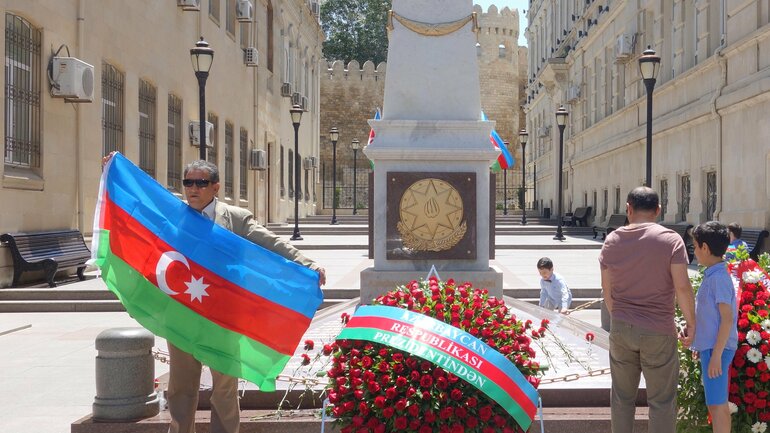Azerbaijan celebrates its secular legacy

While Armenia has been at the centre of global media coverage over the past two months after a successful and peaceful revolution, neighbouring Azerbaijan’s presidential election in April 2018 was hardly discussed in the international media. This is partly because the outcome of this snap election was well known in advance: the vote ensured that president Ilham Aliyev comfortably entered the fourth term of his authoritarian rule.
There was some speculation as to why the election was brought forward from October 2018 to this April; an official statement explained the move with reference to the centennial of the Azerbaijan Democratic Republic, which was founded on 28 May 1918. Aliyev marked the anniversary on that date, which is celebrated as Republic Day, by placing a garland of red roses on the monument to the declaration of independence in Baku at Istiglaliyyat street. This inconspicuous obelisk was unveiled in May 2007 in honour of the Azerbaijan Democratic Republic, which emerged after the collapse of the Russian Empire and existed for twenty-three months before the Bolsheviks took power.
A twofold geopolitical orientation
One hundred years later, modern-day Azerbaijan views Republic Day as the symbol of the rebirth of Azerbaijani statehood and its secular stability. Bordering Russia and Iran, Azerbaijan is a society with a Muslim majority (Shia and Sunni Islam). As a port and oil city, Baku, Azerbaijan’s capital city, leads the Eurasian urban landscape in terms of implementing modernisation projects—at least, infrastructure and grand construction projects—with the goal to boost Azerbaijan’s image in the world and achieve significance as a global city. Baku is a rapidly developing regional metropolis in the South Caucasus, has been called the Dubai of the Caspian Sea, and is a Formula 1 city with ambitious economic visions of the future under the authoritative leadership of the Aliyev dynasty (the current president’s father preceded him as head of state). Indeed, Baku follows two geopolitical orientations simultaneously, towards Europe and the Middle East, that shape the nation’s identity politics. On the one hand, Baku was the venue of the European Song Contest in 2012 and the first European Olympic Games in 2015. On the other, the city was nominated for the title of Capital of Islamic Culture in 2009 and was the venue of the Islamic Sport Games in 2017. Neighbouring Iran accused Azerbaijan of immoral behaviour when Baku hosted the Eurovision Song Contest, an event that Tehran claimed was associated with European ‘gay culture’.
State ceremonies and a public demonstration
It is not surprising that the Azerbaijani embassies in New York, Berlin, Paris, and Moscow have hosted official receptions and formal events propagating the achievements of modern-day Azerbaijan as the successor of the Azerbaijan Democratic Republic, which was the first parliamentary republic in the Muslim world. That republic is praised in Baku for establishing modern, European-style higher education by founding Baku State University, which is now a leading educational centre in Azerbaijan, and for granting women the right to vote even before many countries in the West.
The secular state dominates society, even interfering in the activities of religious communities. In December 2015, a law on religious freedom was amended, prohibiting any manifestation of religious rituals and collective prayer in public spaces, something that had an impact on Shia Muslims in particular because of a public Shia mourning procession, which recently took place in the suburbs of Baku.
In contrast to neighbouring Armenia and Georgia, where the main religion of Christianity is protected by the constitution, Islam does not enjoy similar treatment in Azerbaijan. In contrast to expectations, there has been no visible religious revival on Baku’s streets. Although the Pizza Hut restaurant chain offered a special Ramadan menu and Bazar Store, the most popular supermarket chain, sold iftar food baskets (the evening meal with which Muslims end daily fast at sunset) alcohol was widely available in Baku and Ramadan did not affect the city’s nightlife.
A Soviet-style concert with entertaining Estrada music and obligatory fireworks highlighted the celebration of Republic Day in Baku. However, attendance was limited to the authorities and their high-ranking guests only.
Yet, on 28 May, opposition forces organised a peaceful two-hour rally in central Baku, which was enthusiastically supported by young people and families. The police remained calm and seemed surprised by the joyful atmosphere in the city. Holding national flags in their hands, young people took selfies and posted them on Facebook, the main media platform for alternative opinions, which—surprisingly—has not yet been shut down. The most striking point of this peaceful procession was the lack of Heydar and Ilham Aliyev portraits, which are omnipresent in Azerbaijan. The rally moved from İçəri Şəhər, the main metro station, to Baku waterfront promenade, where it was stopped several times by police.
The main accusation that Azerbaijan’s opposition forces make towards the regime is that it is not interested in marking the centennial politically, and being reluctant to come to terms with the country’s Soviet legacy. Organized via Facebook by intellectuals, among them the ReAL Party (Republican Alternative), a right neo-liberal patriotic movement, the rally yet led to arrests on the next day. The degree of political opposition in Baku is not that high, partly because many members of the opposition are in prison. But some voices in Baku, which define themselves as secular and pro-western, seem to find and test an alternative way of remembering the Azerbaijan Democratic Republic of 100 years ago.
Tsypylma Darieva is a senior researcher at ZOiS. She coordinates the project 'Transformation of urban spaces and religious pluralisation in the Caucasus'.